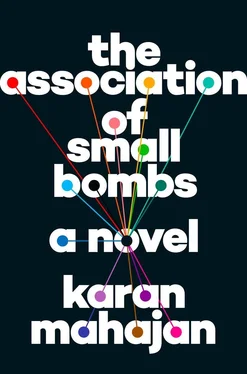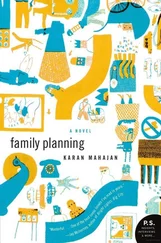Deepa barely registered Afsheen’s presence. “They were such good friends, all of them. Best friends.” She sniffled again, covering her sharp nose with her bony hands, and then said, “I’m so sorry. I’m crying too much.”
“Cry. It’s OK to cry.”
Sharif spent time with an ashen, shocked-looking Vikas. “The terrorists were Kashmiri fellows,” he said, in the measured and serious way of someone unused to emotions, someone obviously puffed up by the opportunity to proffer advice. “It’ll be easy to find these people. They’re not professionals. The important thing is that you take care of Deepa. She needs you. I’ll ask Mansoor if he saw anything suspicious at the market.”
Mansoor was the one who provided the Khurana family with an eyewitness account of the boys’ deaths, putting an end to morbid speculation about their final moments. But he’d been unable to explain to his parents why he’d walked away. “Why didn’t you phone us, beta?” Afsheen said.
“I thought the lines would be cut,” he lied.
“But promise me, if there’s ever, ever such an emergency again, you will phone. Each market these days has hundreds of PCOs.”
But Mansoor — disoriented, overwhelmed Mansoor — wasn’t listening. He was thinking instead of the shattering, deafening moment the bomb exploded, the pain he’d felt in his extremities, the way Tushar and Nakul had snapped into sleep, going from on to off. What could he have done? Though he had no experience with mortality, though he had not gone over to their corpses to examine them, he had known they were dead, and had known there was nothing he could do. How to explain this? How to tell his parents the obvious thing — that walking had been his way of grieving, of indicting the entire city with his eyes?
His parents protected him from the Khuranas and the cremation and the chautha — he was a victim too, after all; his right wrist and arm, fractured, were in a cast — but one day, he was nevertheless taken to meet the Khuranas in their flat. Vikas, grief stricken but affectionate, hugged Mansoor with downcast eyes, smelling his hair deeply, wanting a full version of events. Deepa, dressed in an obscenely yellow kameez, sat on the sofa chair next to him, dazed, a hand on her head, the embodiment of a crushing headache. Afsheen kept throwing worried glances her way. “Deepa, will you have anything to drink?” she asked, even though this was Deepa’s house and the servant could be heard operating the mixie in the kitchen.
Mansoor told them about the auto ride, the walk in the market, the explosion. “But did they die instantly?” Vikas asked.
“They weren’t moving, uncle.”
“But you know for a hundred percent sure?” Vikas said, muddling his words. “We’re trying to make a case against the hospital and the police. When the bomb exploded, people phoned the fire department from the market, and they kept saying, we’re coming, we’re coming. But they didn’t come. They phoned AIIMS for an ambulance and they also didn’t come. They actually put people in the back of a police van and drove them to the hospital. They piled them on top of each other—”
“Answer uncle’s question, beta,” Afsheen encouraged him, realizing Vikas was getting lost in the horror of these imagined events.
“They were no more, uncle,” Mansoor said.
Vikas looked at Mansoor and in that glance it was clear to Mansoor that Vikas blamed him, that this question was not about the hospital or the fire department or the police but about why he had left them to die and walked away.
Why? He didn’t understand either. He saw the landscape, the dripping city with its thousands of watery, refracted lights; saw the dust on the yellow necks of the traffic lights; saw the torrid concrete undersides of the flyovers — saw it all and felt afraid, as if the city had recognized his guilt on the way home and would find a way to destroy him.
________
“Had they gone to pick up a watch or a TV?” Sharif asked Mansoor when they drove home in their Esteem.
“You don’t listen properly,” Afsheen scolded Sharif.
“TV, Papa,” said Mansoor.
“That’s what I thought. Because today I heard some relatives saying they had gone to pick up Vikas’s watch,” Sharif said. “That’s all. I was just checking.”
________
Having chased down the leads, having talked to the boy, having come to see there was no one else to blame, Vikas succumbed to shame. He felt his entire life had been a failure and that it was this failure, particularly the failure to make money, that had brought him to this point: if they’d had a driver, how could this have happened? He kept apologizing to his wife. “I told you I should have gone back to being a CA,” he said, referring to the career as a chartered accountant he had given up thirteen years before to make documentaries. “I’ll do anything for you.”
But Deepa wanted only one thing: revenge. Having passed rapidly through the stages of grief, she had emerged at a clearing of rage and felt the only reasonable thing was to watch the boys’ killers die a violent death. “Do you think they’ve actually arrested the right people?” she asked Vikas.
As usual, the police had made a few arrests right after the blast.
“God only knows, Deepa — I’m so sorry.”
When would this pain end? Vikas wondered. He’d experienced nothing like this — had never known a pain that could slip into every fold of the body — and he could only imagine what his delicate wife was going through. She was not a healthy person to begin with — her lung had collapsed some years before, and cancer ran amok in her family — and he worried that this uprightness, this forced bright rage, was a prelude to serious illness.
The family continued to surround them. But now the advice grew more specific. Bunty Masi suggested they see a guru she visited in GK. “Talk about a great spirit. He touches your hand once and half your problems disappear. Remember how bad Mansha’s leukoderma was? Absolutely gone.” Pratap Tau said grief made people holy and they should consider having another child during this period. “Adoption is also a possibility,” a do-gooder added (the house was full of do-gooders). Rajat offered to buy his brother and sister-in-law an all-expenses-paid tour to Switzerland. “May-June is the best time to go,” he said, smiling awkwardly. “There are very nice waterfalls.”
These people bewildered Vikas. But then again, they had never suffered such a loss, had never really known his kids. To them, every child born into the family was the same, a continuation of genetic material. He remembered why he had cut himself off from these people in the first place.
Deepa grew more and more adamant that they press the police to find the killers. Then, one day, to everyone’s surprise, it happened: the police said they had arrested the terrorists.
Soon after Shaukat “Shockie” Guru received the order to carry out the blast, he went to his alley and washed his face under the open tap outside the building. Then he entered his room and sat on the bed, brooding. The room was small, foggy with dust, ripe with the smell of chemical reagents (there had been construction recently in the alley), poorly painted. The sole decoration was a poster of a slick-bellied Urmila Matondkar from Rangeela . Two charpais lay separated by a moat of terrazzo. The mattress under him was thin. He felt the coir through the clotted cotton.
After a while, he went back into the alley, where afternoon was announcing itself in the form of clothes hung out to dry between buildings and the particular yawning honking that comes from cars when the sun is high overhead, dwarfing human activity, and he went to the PCO and called home. It was his ritual to call home before setting out on a mission. His mother thought he was a student in Kathmandu — at least she made him believe she thought that — and he wanted to give her an opportunity to save him. She is the only one who has the right to decide whether I live or die, he often thought when he smelled milk boiling in the shops — yes, that was the smell he associated with his mother and with Kathmandu. It gave Kathmandu a sweet, plasticky flavor. Of all natural substances, milk has the most artificial smell.
Читать дальше












